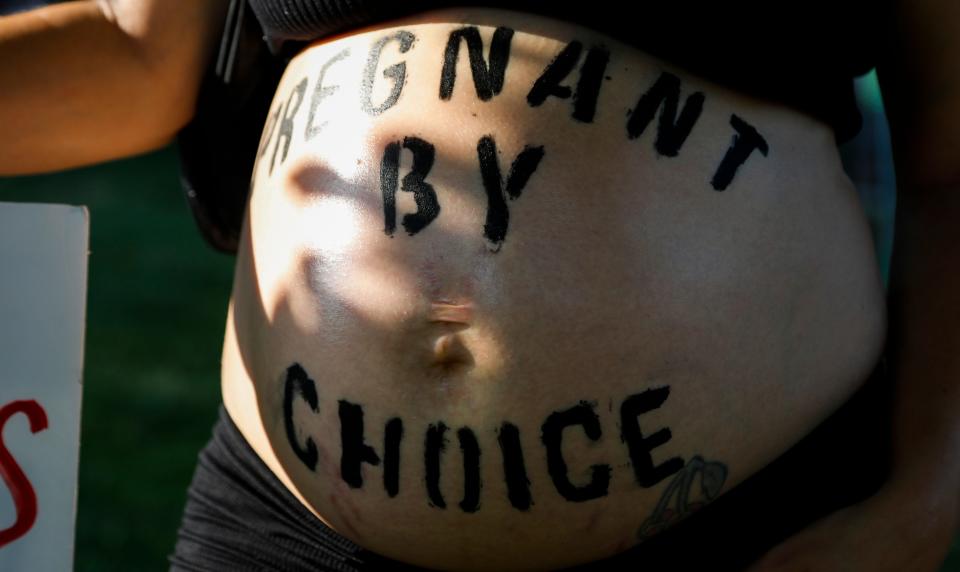Next legal challenge to Missouri abortion ballot initiatives starts Monday. What to know
- Oops!Something went wrong.Please try again later.
- Oops!Something went wrong.Please try again later.
Efforts to restore abortion rights in Missouri through ballot initiatives will face their next legal challenge Monday.
Two cases will be heard in one virtual hearing: one disputing the ballot summary language written by the Secretary of State’s office and another challenging the fiscal note prepared by the Missouri Auditor’s office.
Dr. Anna Fitz-James, represented by counsel from the Missouri ACLU, challenged Secretary of State Jay Ashcroft’s ballot summary language. She argues it would be misleading to voters and sway them to vote against the measure.

Part of Ashcroft’s ballot language indicates that supporting the measure would “allow for dangerous, unregulated, and unrestricted abortions, from conception to live birth, without requiring a medical license or potentially being subject to medical malpractice.”
“The language I wrote is based on the language of the initiative petition,” Ashcroft said. “And if someone actually reads to see exactly what that would allow, and would look frankly at what's happened in other states, I think they'd have to agree that the language that I wrote is accurate.”
Ashcroft pointed to an example of Dr. Kermit Gosnell in Pennsylvania, who was convicted of first-degree murder in 2013 after aborting several babies near their due date. Ashcroft said that the current ballot language would make actions like Gosnell’s legal due to what he described as ambiguity about who is authorized to perform abortions and at what point in the pregnancy a fetus could be aborted.
“I understand the people that wrote the amendment were trying to be very broad, but I'm not sure they realize how much conduct they would legalize and allow,” Ashcroft said.
The ACLU has suggested a ballot summary that asks voters to “establish the right to reproductive freedom that includes the right to make decisions about reproductive health care, including prenatal care, childbirth, postpartum care, birth control, abortion care, miscarriage care, and respectful birthing conditions.”
“At the end of the day, what we really want is fair and sufficient language to be on Missouri voters’ ballot boxes, if this measure is to make it on the ballot in 2024,” said Tori Shafer, the deputy director of policy and campaigns for Missouri ACLU.
This is the second filing of the lawsuit since Cole County Circuit Court Judge Jon Beetem dismissed the same lawsuit in late July, as it was filed before Ashcroft had officially certified the measure.
If the courts disagree with the language filed by Ashcroft, they have the opportunity to either adopt some or all of the language proposed by the ACLU or propose their own ballot summary language.
“In this case, the Secretary of State’s language is so egregious and misleading that we believe the courts will be able to come in and decide their own language,” Shafer said.
New challengers emerge to contest the fiscal note summary
After clearing legal hurdles in the Missouri Supreme Court in July, the fiscal note summary prepared by State Auditor Scott Fitzpatrick has once again come under fire — this time from Republican legislators and anti-abortion activists.
Rep. Hannah Kelly, R-Mountain Grove, and Sen. Mary Elizabeth Coleman, R-Arnold, and Kathy Forck, an anti-abortion advocate from New Bloomfield, filed a lawsuit against state Auditor Scott Fitzpatrick and Secretary of State Jay Ashcroft.
There is a key difference between this lawsuit and the case involving Attorney General Andrew Bailey in July. In the case against Bailey, the Missouri ACLU insisted that his refusal to approve the fiscal note summary because he believed the cost estimate too low was outside the realm of his authority.

The Missouri Supreme Court agreed that the role of the state Attorney General in the ballot initiative process was to ensure that the fiscal note summary met legal language requirements, not to verify the content. That responsibility falls to the state auditor.
The state’s highest court ordered Bailey to approve the fiscal note summary so that the ballot initiatives could progress. However, any Missouri resident has the right to contest the content of that fiscal note after it has been approved.
“The auditor decides the fiscal note, the attorney general signs off, the secretary of state certifies, and then anybody can come forward and challenge the fiscal note,” Shafer said. “So the groups that didn’t like the auditor’s original fiscal note are now challenging that.”
As one of the defendants in the case, auditor Fitzpatrick continues to stand by his work on the fiscal note summary, despite his own personal position on abortion.
“As someone who is unwavering in my commitment to protecting life and who has a long track record of sponsoring and supporting pro-life measures during my time in public office, I would love to be able to say these initiative petitions would cost the state billions of dollars per year,” Fitzpatrick said.
The plaintiffs think that federal Medicaid funding could be at stake, which equals more than $12 billion. In the first lawsuit about the fiscal note, Greene County estimated that it would lose $51,000 — based on estimates of lost tax revenue that would have been paid by future taxpayers — and the plaintiffs think that cost should be extrapolated statewide.
“My office has found no information to support that claim,” Fitzpatrick said. “I have a duty to taxpayers to provide analysis that is as accurate as possible without letting my personal policy preferences be a consideration.”
Secretary of State Ashcroft is also listed as a defendant in this case, but his inclusion is more of a formality due to his office’s role in certifying the fiscal note.
“I'm just looking for the court to give clarity on whether or not the fiscal note is accurate,” Ashcroft said. “And of course, I will follow the law, as I do on all this stuff.”
More: Missouri Supreme Court orders AG to stop delaying abortion-rights amendment
New ballot initiatives face scrutiny from both sides of abortion argument
The language and fiscal note being contested only apply to the 11 ballot initiatives filed by Dr. Fitz-James. An additional six ballot initiatives aimed at reinstating some abortion rights were filed last week by the Missouri Women and Family Research Fund.
These proposals were pitched as a “middle-ground” to the other ballot initiatives already seeking to reinstate abortion rights in Missouri. However, they have come under fire from anti-abortion and pro-abortion advocates.
In a Facebook post, Missouri Healthcare Professionals for Reproductive Rights said, “While we applaud their recognition that our current laws 'make Missouri [look] draconian, punitive and unsafe for families,' we find their proposals dangerous substitutes for the petitions currently making their way through our courts.”
The group, which favors a right to choice in abortion, said in a written statement that it is concerned about the fact that “a right to abortion exists only in cases of rape or incest, threats to the mother's health, or fatal fetal anomalies.” This would require the mother to have reported their rape to a sexual assault hotline, which the group argues would be hard to verify.
Three versions of the six new ballot initiatives would prohibit the government from interfering with a woman’s right to access abortion before 12 weeks of pregnancy. All of the initiatives would provide immunity to women seeking abortions outside the state and to healthcare professionals who help them.
While some of these new measures would allow access to abortions in the first 12 weeks of pregnancy, some anti-abortion activists worry that a clause allowing for abortions up to the point of viability for the health of the mother are too ambiguous.
“It would allow for abortions at any time in pregnancy, for the health or safety of the mother with no determination, whether that's from a physician or any healthcare provider, what threatens health or safety,” said Samual Lee of Campaign Life Missouri, a group opposed to abortion.
Lee feels that passing any of the new ballot initiatives would leave too much room for interpretation of broad language enshrining abortion rights into the state constitution.
“This is what I call Roe vs. Wade on steroids,” Lee said. “Because even under Roe vs. Wade, we had a lot of regulation of abortion, parental consent, and doctors had to have local hospital privileges, and restrictions on funding for abortion.”
More: Education advocates cite Missouri as a top battleground in fight over public schools
With 19 ballot initiatives competing for enough signatures to qualify for inclusion on the November 2024 ballot, there is the possibility of more than one abortion rights amendment for voters to decide upon.
Any one of the ballot initiatives will need to collect more than 171,000 valid signatures before the filing date in May.
If more than one is approved, the Missouri Constitution and other state laws say that “the amendment receiving the largest affirmative vote shall prevail, even if that amendment did not receive the greatest majority of affirmative votes.”
This article originally appeared on Springfield News-Leader: Missouri abortion ballot initiatives face next legal hurdle on Monday

